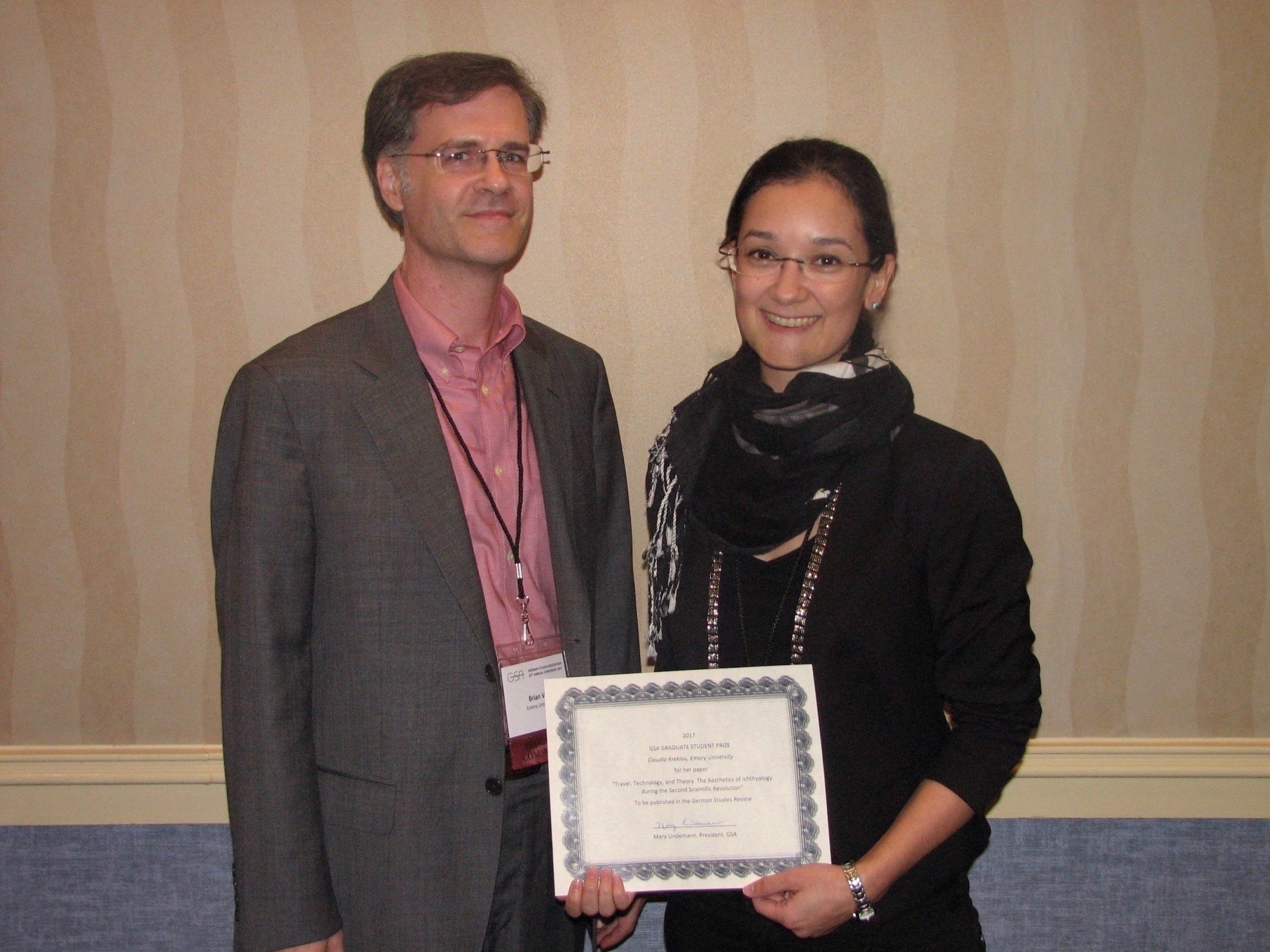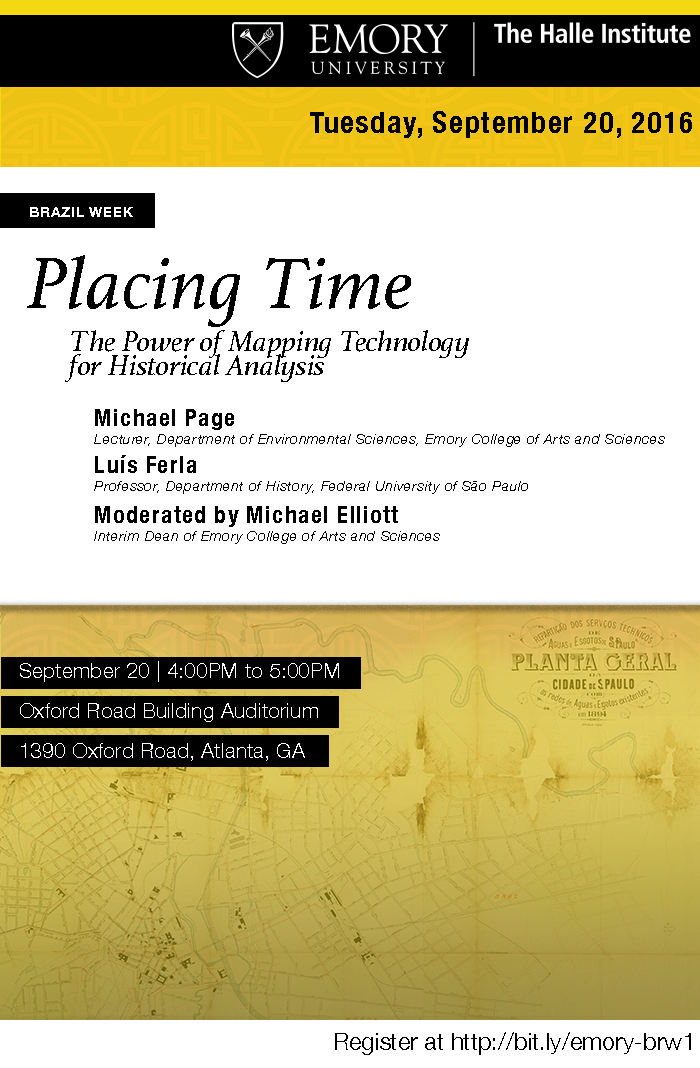The Graduate Program of the Emory History Department will host a panel discussion titled “Beyond the Professoriate: Diverse Careers in History” on March 19. Panelists will include three former graduate students: Sarita Alami, a Brand Marketing Manager at MailChimp; Ed Hatfield, Editor of the New Georgia Encyclopedia; and Chris Sawula, Visual Resources Librarian in the Department of Art History at Emory.
Category / Graduate Students
Innovative Teaching and Learning in Crespino’s “History 385: Right-Wing America” Culminates in “Documenting the Right” Student Film Festival
Students in Dr. Joseph Crespino‘s fall 2017 class, “History 385: Right-Wing America,” produced short documentary films that were screened on November 29 at the “Documenting the Right” Student Film Festival. Students took advantage of Emory’s rich library holdings in crafting videos whose themes ranged from racism in the career of George Wallace to Atlanta’s motto as the “city too busy to hate.” Read more about the project on the Emory Center for Digital Scholarship Blog: “Emory history class uses digital storytelling to study political movements.”
Claudia Kreklau (PhD Candidate) Wins Essay Prize from German Studies Association

Claudia Kreklau and her faculty advisor Dr. Brian Vick.
Big news! Congratulations to Claudia Kreklau for winning the 2017 Graduate Student Essay Prize of the German Studies Association for her paper “Travel, Technology, and Theory: The Aesthetics of Ichthyology during the Second Scientific Revolution.” The prize jury thought that the essay “stood out for its clear organization, its accessible, lucid writing, and its deep level of research.” As part of the Prize, the essay will be published in the German Studies Review. As the laudatio indicates, “whether one comes from the angle of the historian, or literary scholar, or naturalist, this essay offers innovative and persuasive perspectives on the intersection of the natural world with technology and human intervention.” Congratulations, Claudia, on this major achievement!
Ben Nobbs-Thiessen (PhD 2016) Wins Dissertation Award
Congratulations to Dr. Ben Nobbs-Thiessen for winning the 2016 Gilbert C. Fite Award for the best dissertation on agricultural history from the Agricultural History Society. He completed his dissertation, “The Cultivated State, Migrants and the Transformation of the Bolivian Lowlands, 1952-2000,” in 2016 under the advisement of Drs. Jeffrey Lesser, Peter Little, Thomas D. Rogers, and Yanna Yannakakis. Read the below for a more detailed explanation of Nobbs-Thiessen’s research:
My research explores the role of migrants in the “March to the East” a large-scale settlement and rural development initiative undertaken by the Bolivian state after 1952. Over half a century hundreds of thousands of settlers arrived in the tropical Department of Santa Cruz in Bolivia’s Eastern Lowlands to begin new lives as frontier farmers. Among the migrants were indigenous Bolivians from the nation’s highlands, low-German speaking Mennonites from Canada, Paraguay and Mexico as well as groups of Japanese and Okinawan colonists that had been re-settled with support from the Japanese government and the U.S. military. Together these diverse streams made the March to the East a uniquely transnational affair and a compelling case study for understanding migration and mid-century rural modernization.
Alumni Update: Dr. Glen Goodman (PhD, 2015) Wins Fulbright and German Academic Exchange Service Grants
The History Department sends its congratulations to Emory alumnus Glen Goodman, Assistant Professor in the Department of Spanish and Portuguese at the University of Illinois at Urbana-Champaign. Dr. Goodman won a Fulbright grant to teach in the graduate program in History at the Federal University of Rio Grande do Sul, located in Porto Alegre, during the spring semester 2018. In addition, the German Academic Exchange Service (Deutscher Akademischer Austauschdienst) awarded Goodman a research grant to conduct archival work in Berlin during the summer of 2017. Goodman was an advisee of Dr. Jeffrey Lesser, Department Chair and Samuel Candler Dobbs Professor of History.
PhD Alumnus Adam T. Rosenbaum on Mentoring the Senior Thesis in ‘Perspectives on History’
PhD alumnus (’11) Adam T. Rosenbaum published an article in the March edition of Perspectives on History, the newsmagazine of the American Historical Association. The publication, “Leading by Example: The Senior Thesis and the Teacher-Scholar,” charts Rosenbaum’s novel approach to teaching a seminar in which undergraduates write a capstone thesis. Rosenbaum was recently tenured at Colorado Mesa University and his book, Bavarian Tourism and the Modern World, 1800–1950, was published by Cambridge UP in 2016. Check out an excerpt below and read the full piece in Perspectives here.
“As I prepared to teach the course a second time, I decided to make some changes. I rewrote the syllabus with a narrower focus on the history of the Third Reich, abandoning the topical flexibility of the first incarnation. I created a five-page bibliography of English-language sources related to that subject, providing students with a significant head start. Then I had another idea: I would write a thesis paper alongside my students, completing all the assignments along the way.”
Dr. Erica Bruchko (PhD Alumna) Featured by Emory News Center

The Emory News Center recently profiled Erica Bruchko, a graduate of Emory’s History Graduate program and now the African American Studies and U.S. history librarian at Emory. The article, titled “Erica Bruchko: Helping researchers in Emory Libraries’ African American, history collections,” charts Bruchko’s trajectory from her time as an undergraduate in South Carolina through her recent work expanding Emory’s impressive library collections. Read the full article here.
Graduate Students Design and Teach Spring 2017 Courses
Three graduate students from the History Department are teaching courses this spring to Emory undergraduates. Professors Julia López Fuentes, Audrey Henderson, and Jennifer E. Morgan designed and developed original courses as a part of the Laney Graduate School’s TATTO program. This opportunity provides graduate students with valuable teaching experience and comprises part of the Department’s holistic training for future teachers and scholars.
Check out the syllabi for the Spring 2017 offerings below and browse the courses from Spring 2016, as well.
- “Democracy and Dictatorship in the Twentieth Century” (López Fuentes)
- “Latin America: A History” (Henderson)
- “American Society to 1877: History from the Margins” (Morgan)
Graduate Student Timothy Romans Wins Essay Prize from SECAAS
Congratulations to Emory History Department graduate student Timothy Romans, who recently won a prize for his essay “The Merchant, the Pirate, and the Telescope Maker: The Many Heroic Lives of Hamada Yahyōe.” Awarded by the Southeast Conference of the Association for Asian Studies (SECAAS), the prize was announced formally at the annual SECAAS meeting in mid-January 2017 in Oxford, Mississippi.
Emory Launches First Annual Brazil Week, September 19-23

On September 19, 2016, Emory will inaugurate the first annual Brazil Week, a celebration of the university’s engagement with Brazil. The multidisciplinary series of activities, organized by Emory’s Brazil Initiative through the Claus M. Halle Institute for Global Learning, will involve History faculty and students from Emory and elsewhere. History Department faculty within the Brazil Initiative include Dr. Jeffrey Lesser (Chair and Samuel Candler Dobbs Professor of History) and Dr. Thomas D. Rogers (Associate Professor of Modern Latin American History). Check out a schedule of events below, read more about the Brazil initiative, and visit this page to register for the week’s events.

Placing Time: The Power of Mapping Technology for Historical Analysis
Tuesday, September 20
4:00-5:00pm
Oxford Road Building Auditorium
Emory professor Michael Page will present Atlanta Explorer, a project dedicated to building and disseminating geographical datasets and tools for exploring Atlanta’s history. Professor Luís Ferla of Federal University of São Paulo will describe the work of Hímaco: History, Maps, Computers, a collaborative laboratory of historians, geographers, and computer scientists exploring the spatial history of São Paulo. This panel, moderated by Professor Michael Elliott, Interim Dean of Emory College of Arts and Sciences, features the current work of these partners in a new collaboration on Brazilian urban studies.
Zika: A Brazilian Perspective on A Global Challenge
Wednesday, September 21
4:00-5:30pm, followed by a casual reception
Atwood Hall 360
(New Chemistry Building)
Zika virus’ arrival in Brazil and the rest of the world unleashed a storm of public health challenges and media attention. Brazil has been at the forefront of the epidemic and the efforts to address it, and transmission is now ongoing in many areas in the Americas, including Florida and Puerto Rico in the U.S. Dr. Mariana Kikuti, DVM, PhD Candidate, Federal University of Bahia; Dr. Uriel Kitron, Goodrich C. White Professor of Environmental Sciences, Emory University; Dr. Igor Paploski, DVM, PhD Candidate, Federal University of Bahia; and Dr. Lincoln Suesdek, Researcher at Scientific Council of Butantan Institute, Brazil, will provide a brief overview of Zika and its mosquito vector – Aedes aegypti, present findings from their studies in the Brazilian cities of São Paulo and Salvador, and answer questions from the audience.
Bate-Papo: Portuguese Conversational Hour
Friday, September 23
1:00-2:30pm
Great Room, Longstreet-Means Hall
Come join us for pizza and conversations in Portuguese with students, faculty, and staff from across the university and broader community.
Additional cultural events will be organized throughout the week by the Brazilian Student Association (BRASA), including Capoeira Performance/Workshop on Monday, September 19 at 7:30 pm in the Woodruff P.E. Center and a Samba performance. Visit here for updates and details.
